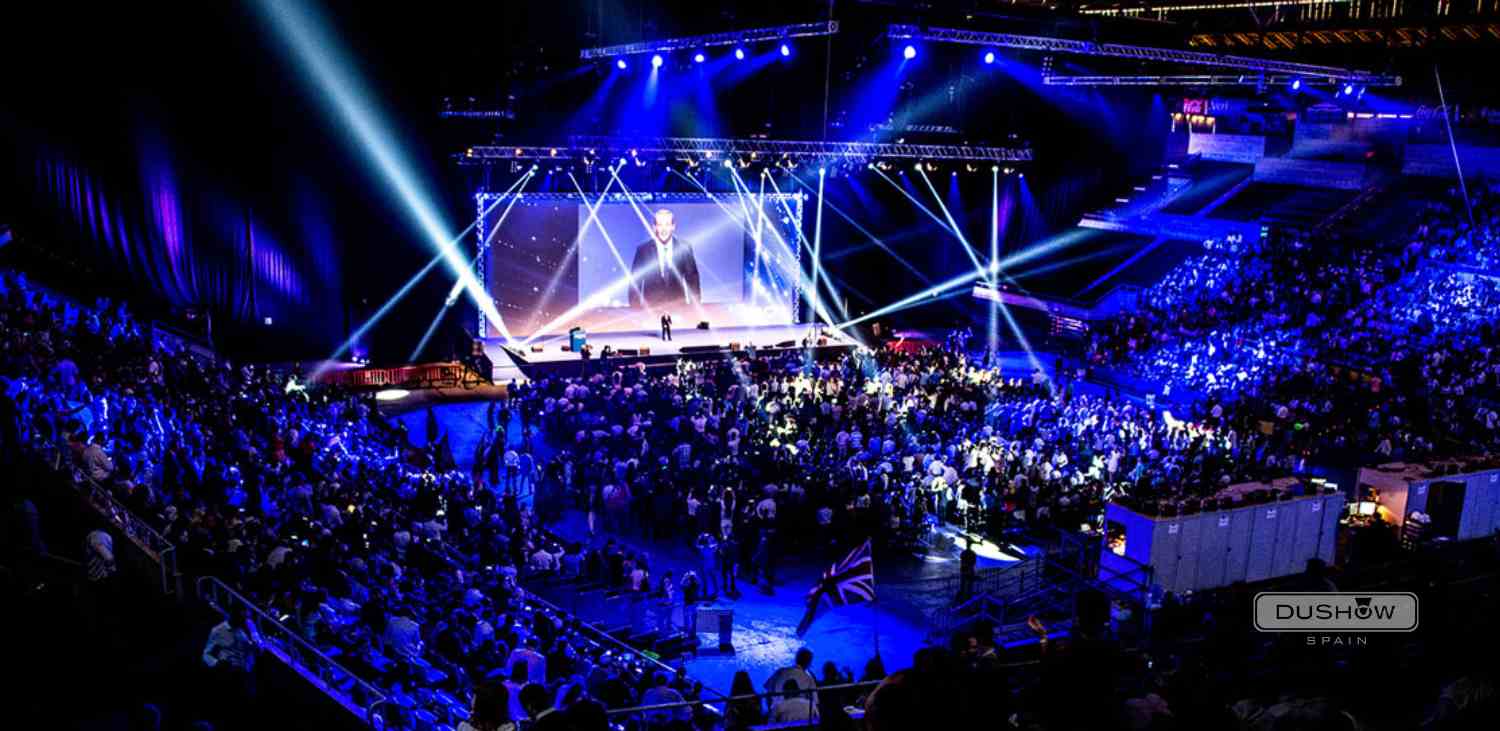Transform any venue with the help of event production charlotte
Wiki Article
How Event Production Functions: A Comprehensive Look at the Refine
Event production is a complex and structured process that requires mindful preparation and implementation. It begins with establishing clear goals and recognizing the target audience. Each step, from budgeting to venue choice, plays a crucial function in making certain success. As the process unfolds, numerous components should straighten seamlessly. Yet, the nuances of this complex procedure commonly go undetected. What are the essential phases that add to an unforgettable event?
The First Planning Stage
When starting on event production, cautious planning is vital to guarantee an effective end result. The initial preparation phase serves as the foundation for all succeeding initiatives. During this stage, event producers should define the event's purpose and goals plainly. Identifying the target audience assists customize the experience and messaging, guaranteeing relevance and engagement.Producers should likewise take into consideration the event format, whether it be in-person, virtual, or crossbreed, as this will certainly affect various logistical components. Selecting an ideal date and place is critical, as it influences ease of access and availability.Furthermore, setting up a trusted team is essential for dividing obligations and streamlining communication. Establishing a timeline with landmarks warranties all jobs are finished on time. This phase entails thorough research study, consisting of recognizing potential difficulties and designing approaches to alleviate threats. Ultimately, a well-structured preliminary preparation phase sets the tone for an effective event production trip.
Budgeting and Source Allotment
In event production, efficient budgeting and resource allotment are critical for success - event production charlotte. Developing economic parameters establishes the structure for all subsequent decisions, while source distribution techniques ensure that every part of the event is effectively sustained. Together, these components assist keep control over expenses and maximize making use of offered sourcesDeveloping Financial Parameters
Developing monetary criteria is essential to the success of any type of event production, as it sets the foundation for efficient budgeting and source allocation. This procedure begins with specifying the total spending plan, which incorporates all aspects of the event, including place prices, event catering, and marketing. By determining available funds, event coordinators can prioritize expenses and allot resources appropriately. Additionally, it is necessary to carry out thorough marketing research to anticipate prospective expenses and recognize funding sources, such as sponsorships or ticket sales. Establishing clear financial parameters additionally aids in danger monitoring, permitting planners to allot backup funds for unanticipated expenses. Inevitably, a well-defined spending plan functions as a roadmap, directing the event production group in the direction of accomplishing their objectives while keeping economic control.Source Distribution Methods
Effective resource distribution approaches are essential for optimizing the effect of an event while sticking to spending plan restrictions. Effective event production calls for a thorough approach to budgeting and resource allocation. Coordinators must prioritize necessary aspects such as place, food catering, and innovation, ensuring that funds are allocated to locations that boost attendee experience. A comprehensive spending plan needs to outline anticipated costs and recognize areas for prospective cost savings, such as discussing with vendors or exploring sponsorship possibilities. In addition, tracking expenditures throughout the planning procedure helps protect against overspending. By using strategic resource distribution, event manufacturers can deliver an unforgettable experience while keeping financial duty, eventually adding to the general success of the event.Venue Selection and Logistics
Choosing the ideal location is vital to the success of any type of event, as it sets the stage for the overall experience. Place selection entails examining various aspects, consisting of capability, availability, and area. Organizers should think about the target market and the nature of the event, making sure the place aligns with the event's goals.Logistics play a substantial role in this process, involving plans for seats, audiovisual devices, and providing solutions. A well-chosen location ought to assist in smooth flow for guests and team, improving engagement.Additionally, reviewing possible places for services like car parking, bathrooms, and fire escape is important for safety and security and ease. The timeline for protecting the place is additionally critical, as popular locations might reserve promptly - event production charlotte. As a result, thorough planning and prompt implementation can ultimately add to a smooth event experience, making venue selection and logistics essential elements of successful event production
Imaginative Idea Advancement
While the location sets the physical stage, creative principle development forms the event's identification and story. This procedure begins with identifying the event's objective and target market, enabling event producers to create a compelling style that resonates with guests. Conceptualizing sessions typically include diverse point of views, cultivating ingenious ideas that line up with the event's goals.Once a theme is established, aesthetic aspects such as color palettes, signage, and style are developed to improve the overall environment. Narration methods may likewise be integrated to produce an interesting journey for participants, assuring a memorable experience. Furthermore, considerations relating to entertainment, tasks, and interactive elements are aligned with the selected idea, enhancing the motif throughout the event.Ultimately, reliable imaginative principle advancement guarantees that every aspect of the event works cohesively, leaving a long-term impact on guests and fulfilling the event's goals. This foundational job lays the groundwork for succeeding preparation and implementation stages.Collaborating With Suppliers and Vendors
Effective event production pivots on efficient collaboration with vendors and distributors. Choosing reliable partners, working out agreements efficiently, and making certain timely distributions are vital action in this process. Each of these variables adds greatly to the overall success and smooth implementation of an occasion.Selecting Reliable Partners
How can event planners ensure a smooth production experience? Selecting reliable companions is essential in achieving this goal. Event planners must perform detailed research study to recognize suppliers and suppliers with a proven track document of excellence. This includes checking recommendations, examining profiles, and reviewing customer feedback. Organizers must prioritize companions great post to read who show professionalism and reliability, prompt communication, and a determination to work together. Structure solid partnerships cultivates trust and enables quick analytic during the event. In addition, it is useful to select local suppliers who understand the place and local logistics. Inevitably, a successful event pivots on the synergy between coordinators and their companions, making certain that every facet of production runs smoothly and successfully.Negotiating Agreements Effectively
Efficient settlement of agreements is an essential step in the collaboration between event planners and their vendors and suppliers. This procedure entails clear interaction of assumptions, deliverables, and timelines. Coordinators ought to carry out comprehensive research on market prices and sector requirements to establish a baseline for arrangements. It is very important to produce a collaborative environment, urging open discussion concerning terms, pricing, and potential contingencies. Coordinators ought to also prioritize recognizing the vendor's capacities and constraints to align their requirements successfully. Versatility can lead to mutually advantageous contracts, fostering lasting relationships. Crafting distinct contracts that include particular efficiency metrics can assist ensure accountability, ultimately resulting in effective event implementation and fulfillment for all events entailed.Ensuring Timely Shipments
Prompt shipments are vital for the smooth implementation of any type of event, calling for persistent cooperation between planners and their vendors and vendors. Efficient interaction is vital, as it assists establish clear expectations pertaining to distribution schedules, quantities, and specific requirements. Organizers typically create comprehensive timelines to describe vital milestones, making sure all events stay lined up throughout the process. Normal check-ins with vendors can help determine prospective delays early, enabling proactive options. Additionally, building strong connections with trustworthy vendors cultivates trust fund and accountability, which can result in much better service and prioritization. By prioritizing these collaborative efforts, organizers can minimize interruptions, consequently improving the total efficiency of event production and ensuring that all needed materials and solutions show up as planned.Marketing and Promo Techniques
While arranging an event, the success of advertising and marketing and promo techniques can substantially influence presence and engagement. Reliable strategies usually consist of a combination of digital marketing, standard advertising, and grassroots outreach. Making use of social media sites systems enables real-time communication and targeted marketing, getting to specific demographics effectively. Email advertising and marketing projects can even more engage potential participants with tailored material and reminders.Collaborations with influencers or sector leaders can also enhance reliability and widen reach. Producing interesting content, such as video clips or blog sites, aids to create buzz and receive interest leading up to the event. In addition, leveraging early-bird price cuts and unique rewards can incentivize ticket purchases.Promoting through standard networks, such as posters or local media, remains appropriate, particularly in community-focused events. A detailed technique that incorporates numerous methods warranties maximum visibility and interaction, ultimately adding to the event's success and the creation of a remarkable experience for guests.
On-Site Execution and Management
On-site execution and management are necessary parts that establish the general success of an occasion. Effective sychronisation during the event assures that all this content aspects line up with the intended schedule. Event supervisors oversee logistics, consisting of supplier control, equipment setup, and visitor services. Keeping an eye on timelines and addressing any kind of unexpected issues are basic for keeping a seamless experience.The personnel plays a significant duty, as skilled employees are accountable for numerous tasks such as enrollment, info dissemination, and technological support. Communication among staff member is important; it fosters a joint setting and enables quick resolution of challenges.Additionally, safety and security procedures should be followed, protecting the wellness of all participants. Post-event assessments are likewise component of on-site monitoring, supplying understandings for future improvements. By concentrating on these aspects, event producers can produce memorable experiences that satisfy or go beyond participant expectations while achieving the event's goals.Often Asked Concerns
Just how Do I Choose the Right Event Style?
Choosing the best event style entails considering the target market, event function, and place. Investigating current fads and collecting input from stakeholders can also inspire innovative ideas image source that resonate and develop a memorable experience.
What Are Typical Errors in Event Production?
Typical blunders in event production usually include poor preparation, inadequate communication amongst employee, budget mismanagement, disregarding to consider the audience's needs, and failing to conduct a complete post-event examination for future renovations.Exactly How Can I Determine Event Success?
To measure event success, one can analyze participant complete satisfaction, engagement degrees, spending plan adherence, and post-event responses. Key performance signs, such as ticket sales and social media interactions, likewise provide valuable understandings right into general performance.What Should I Do if It Rains on the Event Day?
In case of moisten the day, the organizer should apply backup plans, such as safeguarding tents or relocating tasks inside your home. Interaction with guests regarding modifications is important to assure a smooth experience despite weather difficulties.Exactly How Can I Ensure Guest Interaction During the Event?

Report this wiki page